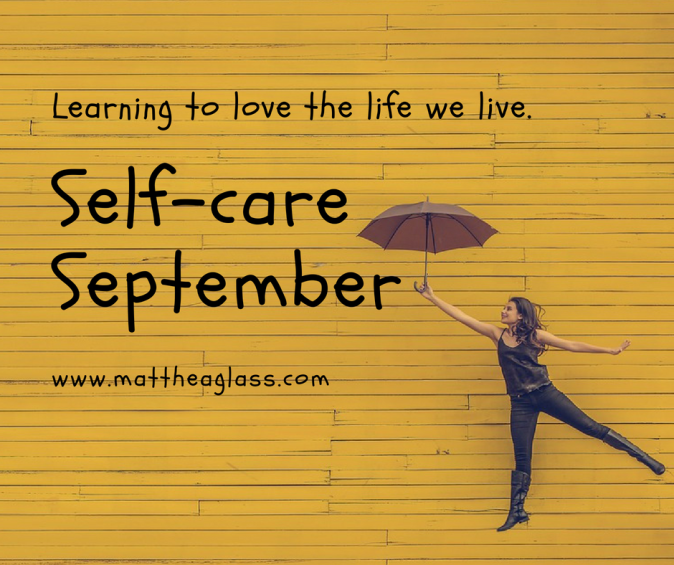Self-care September… Yes, please.
For most of my life I have tried to live as if I had no needs. I am strong, independent, and I can do it all myself. To have a need that we can’t fulfill ourselves opens us for someone to harm us or reject us. We must trust someone. These are scary things for some of us. So, we try to do it all, and it’s exhausting.
The truth is we all have needs. God created us with needs, so that we will continual seek fulfillment in Him. When we get hungry, thirsty, or sleepy, it’s a reminder to stop and thank the Lord for providing for us. One of the only miracles to be recorded in all four gospels was the feeding of the 5,000. We are all hungry souls searching for love, comfort, and fulfillment.

Good self-care starts with acknowledging that we have legitimate needs that we can’t always fulfill ourselves. Self-care September is dedicated to learning how to care for ourselves in godly ways that bring glory to the Lord and lifts high the name of Jesus in our lives and the people around us.
First things first. Let’s acknowledge family dysfunction that often leads us to neglect caring for ourselves or we may even over care about ourselves. Every family since the first family has dysfunction. Please resist the need to become defensive. The first family had a Perfect Father, who loved them and taught them perfectly. The children had never known sin, and Adam and Eve, the first children, still disobeyed God their Father. Adam and Eve handed down dysfunction to their children who in turn handed down dysfunction all the way to us. Jesus gives us a choice. We can continue to live in dysfunction, or we can acknowledge it, agree with Him that it is dysfunction, and receive healing.
Why I am not using the word sin? Because some of our problems are sinful, but some of it’s just dysfunctional. This is what I mean. If you can say yes to any of these statements, there was some dysfunction in your family.
- Guess what is normal.
- Have difficulty following a project through to completion.
- Lie, when it would be just as easy to tell the truth.
- Judge yourself without mercy.
- Have difficulty having fun.
- Take yourself very seriously.
- Have difficulty with relationships.
- Overact to changes over which you have no control.
- Constantly seek approval and affirmation.
- Either super responsible or super irresponsible.
- Extremely loyal even when the loyalty is undeserved.
- Look for immediate rather than deferred gratification.
- Lock yourself into a course of action; no serious consideration for alternate behaviors or possible consequences.
- Seek tension and crisis, and then complain about the results.
- Avoid conflict or aggravate it; rarely do you deal with it.
- Fear rejection and abandonment, yet are rejecting of others.
- Fear criticism and judgement, yet criticize and judge others.
- Manage time poorly and do not set priorities in a way that works effectively for you.
What if God can heal our anxieties? What if we don’t have to live from crisis to crisis? What if we can enjoy the life we live?
All of these things are possible!
Learning effective self-care begins with facing the foundation of our dysfunction. A good life doesn’t just happen. It takes some work.
Maybe you’re like me, and you think that some people are just blessed with a good life because they’re lucky. No! They had different teachers that understood legitimate needs and responded to their emotional and physical needs in a healthy manner. Some where along the way some one broke the chains of dysfunction. Learning how to acknowledge my dysfunction, admit my faults, and seek healthy responses to the world around me has allowed me to love the life I live.
If this first post intrigues you, stick with me as we study the story of Esau and Jacob in Genesis 25-36. This biblical family’s dysfunction mirrors ours today.
Throughout September I will have a tip on how I reduce anxiety in my life.
Tip #1 Make a monthly menu for lunch and dinner.
I know the anxiety every night, “What’s for dinner?” Everyone’s hungry, and I’m tired. Sitting down and creating a monthly menu makes me stressed for one day instead of every day. I know you have heard the term mental load. (Mental load refers to the effort being used in the working memory.) Taking the time to write out a monthly menu takes lunch and dinner off your mental load list. After a few months of writing menus, you will have a reservoir of menu ideas. It gets easier after the first few months.
Please, don’t get bogged down on Pinterest. It’s a great resource, but if it makes you anxious just hearing the word Pinterest, know that you are not alone. Write out the meals your family typically eats. They don’t have to be fancy. Make it work for you.
The bonus of this tip is that you will find that you save money by eating at home for dinner and packing your lunch instead of eating out!



Great idea
LikeLiked by 1 person
Pingback: Love, Hate, and Manipulation – Flourishing Faith